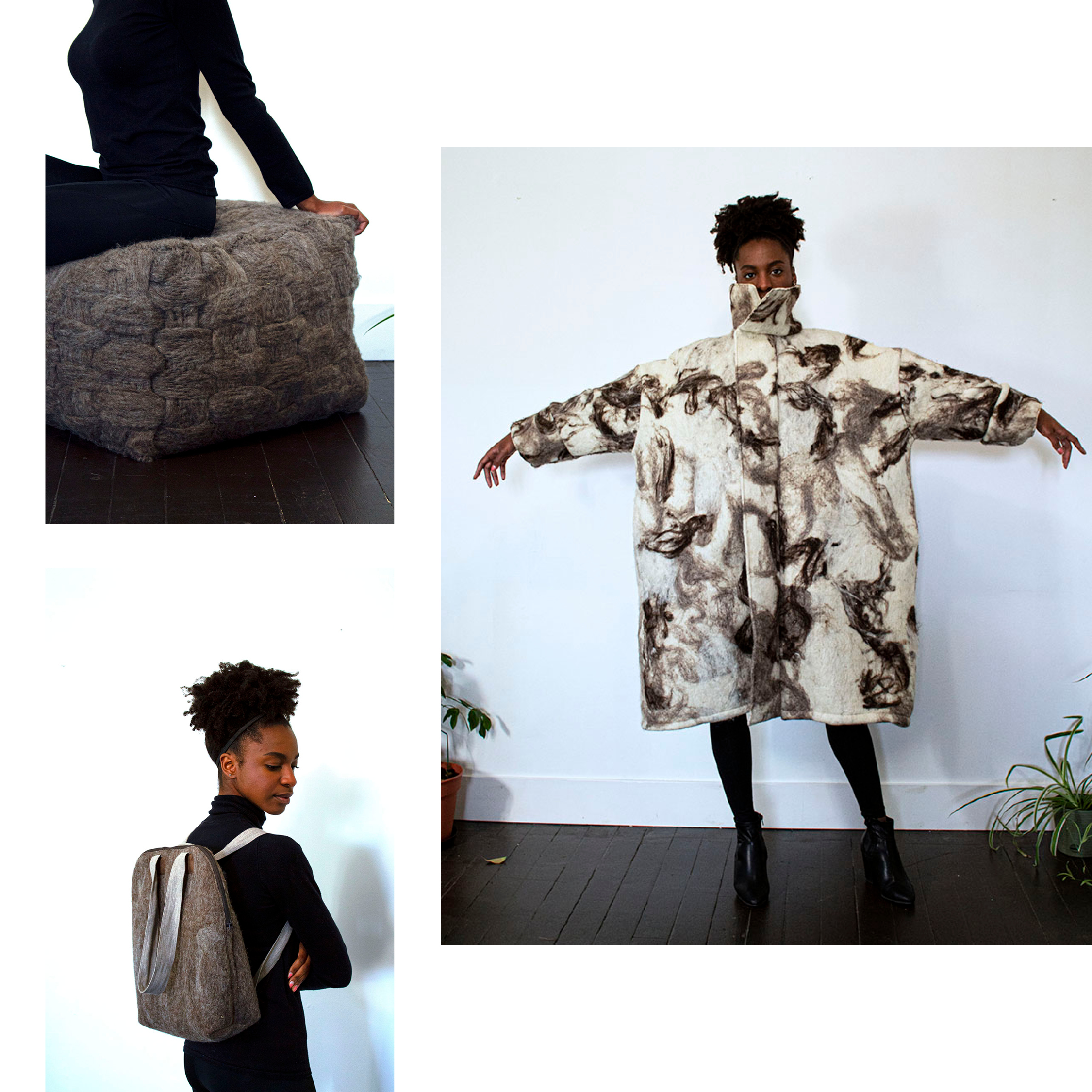Ash Logan of Make Change Studio/Fibreshed Field School wins Ecological Design Award with ‘(re)valued’ as part of Emily Carr University’s 2020 Graduation Awards
By Nicole Yamamoto
Emerging designer Ash Logan (BDes 2020) takes a distinctive approach to the controversial textile industry by exploring the breadth of possibilities regional fibres offer to clothing production with her Emily Carr University grad project ‘(re)valued’. The project consists of a series of artifacts, a coat, a pouf, and a tote-back (tote bag + backpack). Ash, who utilized wool fibres from sheep, concentrated ‘(re)valued’ on the ecological impacts of textile production. She describes each artifact as “a representation of [its] process, designed to provoke conversation around our values, the material economy, connection, and to encourage a new urban mythology”. The project went on to receive the Ecological Design Award, making Ash one of the twenty-eight students who received graduation awards in acknowledgement of their exceptional work and accomplishments. “I wanted to push the boundaries of what sustainability in textiles could really look like,” Ash says. “Winning this award makes me believe I have achieved those goals.”

Model: Ketrice Anderson
Photos by Ash Logan
In her final year of courses, Ash had the opportunity to participate in Make Change Studio—a program delivered by the Shumka Centre for Creative Entrepreneurship in partnership with Simon Fraser University that brought together design and business students to develop a design-led, socially responsible venture throughout 2019 – 2020. Titled (Re) Fashioning the Local Textile Industry, the program focused specifically on Vancouver’s sustainable textile industry.
Ash says the program had a direct impact on her grad project. “There were readings that were assigned in the beginning of the semester that helped me in my research phase, specifically academic works by Kate Fletcher,” she explains. “The event I helped to curate, Local Fibres: Local Futures, was very influential for my grad project. I was able to connect with the local textile community and have critical discourse, it was really great to hear multiple perspectives on the topic of textiles and sustainability.”
‘(Re)valued’ was a long, messy and time-intensive project, according to Ash. “Every material used to create the three products was thought through, down to the silk thread used (minus the zippers), so that when they reach their end life they can be put into the compost and become a part of nature again.” Alongside the daunting rise of COVID-19, Ash had to face many hurdles throughout the school year; from narrowing down her extremely large project scope to figuring out how to create meaningful work. “The first semester felt like a lot of uncertainty and a lot of ‘what exactly am I trying to do?” she says. With the small textiles-based curriculum offered at ECU, Ash says she took enough electives to fully cultivate her love for and comfort with the medium. “I had a lot of encouragement from a few of my instructors and mentors including Heather Young, Emily Smith and Helene Day Fraser”.
Since her graduation, Ash has been working hard on her business Altered, and with sustainability at the forefront of the conversation, is preparing a new viable bespoke clothing business using regional textiles and deadstock fabric. “Graduating into a global pandemic and recession wasn’t exactly how I imagined post-school to look like, but I trust that there is something exciting on the horizon”.
Evolved out of Make Change Studio, Shumka Centre now operates Fibreshed Field School, an experiential mentorship program that investigates ecologically sensitive and economically viable methods of local textile production. Created and led by Emily Smith, the project also involves Ash as its coordinator. You can read more about Fibreshed Field School here.
